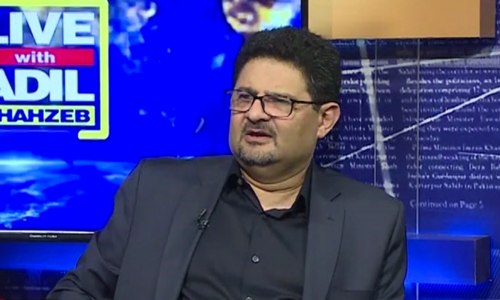IT cannot be easy to be finance minister in times like these, with friend and foe alike gunning for you over difficult decisions that you were forced to take in the greater national interest. This is the sorry predicament Miftah Ismail finds himself in at the moment, merely two and a half months since he took over arguably the most difficult job in Pakistan.
It is unclear why he is being given such short shrift. It appears from a recent statement made by Defence Minister Khawaja Asif during a TV show that some within the party hold Mr Ismail responsible for eroding the PML-N’s political capital. However, this is quite an amnesic reaction on the part of these individuals, considering that the risks to the PML-N’s electoral prospects arising from the economic adjustments the coalition government was going to be forced to undertake were extensively discussed and understood. The party knew what it was getting into when it decided to stick it out in Islamabad after ousting the PTI from power.
There was nothing easy or simple about the task Mr Ismail was handed, but he had a plan even before he was anointed finance minister. In fact, it seems that the government got delayed in its response to the economic crisis because individuals within the PML-N initially did not want to give Mr Ismail the go-ahead to execute his agenda.
Read: Miftah won't mind leaving finance ministry if Dar returns but not open to state minister's role
This was apparent after the London episode, when most of the PML-N cabinet was summoned to the UK for deliberations with Mian Nawaz Sharif on the best way forward. Insider accounts of that meeting indicate that former finance minister Ishaq Dar did not agree with Mr Ismail.
Mr Dar apparently had very different ideas about how to extricate Pakistan from the current economic morass. It seems his misgivings never really went away, even though Mr Ismail was allowed to start rolling out his plan in bits and pieces. If rumours are anything to go by, Mr Dar plans to displace Mr Ismail from his post upon his expected return to Pakistan later this month.
There is nothing reassuring about this tug of war, which bodes ill for economic stability. Much damage has already been done to the economy due to the PML-N’s infighting over key policy decisions over the past two months. Tussles within the party created political instability, spooking capital markets and leading to considerable damage before budget negotiations with the IMF finally created some hope for stability and led to the restoration of a semblance of order.
The market now expects the finance minister to deliver on the IMF front. By most accounts, we are now on the last stretch of negotiations. Any major upheaval in the finance ministry — especially one that sees the main decision-maker changed — is likely to once again set the process back. Is that something we can afford?
Published in Dawn, July 6th, 2022













































